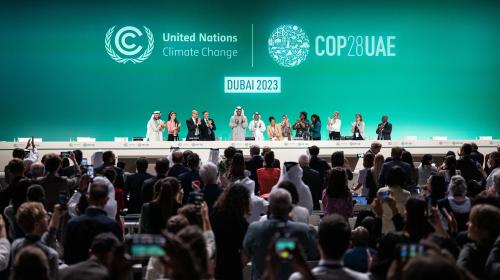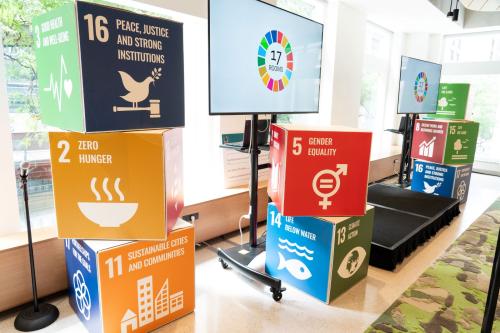Editor’s Note: This commentary was originally published by the
National Journal
in response to Chairman Ed Markey’s (D-Mass) question below.
Chairman Markey: In light of obstruction by Senate Republicans, the United States has failed to send a signal to the world that we intend to be the leader in clean energy jobs and technologies. Following massive humanitarian disasters across the globe from extreme weather events occurring during the hottest year on record, what programs, success stories and new ideas can the United States bring to the table in Mexico? With trillions of dollars in private investment hanging in the balance, how can the United States convince the world we are serious about clean energy jobs and not in denial about the threat we currently face? And what firm commitments will need to be made at these negotiations to move the process forward?
Nathan Hultman: Chairman Markey asserts that the U.S. has failed to send the world a signal that we intend to be the leader in clean energy jobs. This is undoubtedly a true statement: there is widespread acknowledgment that despite our leadership in science and technology research, the United States is not a leader in the engineering and manufacturing of most new, low-carbon energy technologies. For an answer as to why, we need only look to the reward structure that we have in place — unlike countries which have developed strong and export-oriented energy technology industries (such as Denmark, Germany, Israel and Japan), our search for energy independence has relied much more heavily on securing supply for fossil technologies than for rewarding the diffusion of renewables and efficiency.
Second, Chairman Markey implies that the U.S. should seek to convince the world that we are serious about clean energy jobs. Even if we were serious about clean energy, it is not necessarily obvious why would need to convince the world that we are. The roots of the answer lie, paradoxically, squarely in the ashes of the Kyoto Protocol. While the Kyoto Protocol had some redeeming features, it is widely acknowledged that this attempt to legislate emissions reduction in different countries through a U.N. treaty process was perhaps overoptimistic, and surely ineffective. The uncertainties about future economic growth and costs of carbon abatement were simply too large to allow for all the major countries to step into the regime with full confidence that they could deliver on their promises.
As a consequence of these lessons, and of the failures of last year’s Copenhagen meeting to deliver a replacement for Kyoto, the burden of addressing climate change will fall on policy actions taken at the national level. But because of the collective action dimension of climate change, countries will be willing to undertake more aggressive actions if they believe that their neighbors (and economic peers or competitors) will also be moving their energy economies in the same direction. The world is watching the U.S., and even our own domestic clean energy policies will therefore have an effect on world behavior. Interestingly, a clear signal that the U.S. is making a strong domestic — not an international — commitment to clean energy could therefore have more of an effect on international policy than a commitment to a weak international agreement. And indeed, there are many reasons to believe that the benefits of developing domestic, low-carbon energy technology industries will be tangible and long-lasting, and will go far beyond the simple and necessary reduction in greenhouse gas emissions.
How can the U.S. do this? First, by funding energy technology research through our domestic research and engineering infrastructure — one of our international comparative advantages and one of the crown jewels of post-WWII science and technology policy. Second, by continuing to expand the energy innovation partnerships with other countries that were started under the Bush administration and expanded under the Obama administration’s Clean Energy Ministerial. Third, and most importantly, by establishing a steady and increasing system of market-based mechanisms and standards to support the diffusion of energy technology domestically, and making a long-term commitment to stability in these mechanisms. And fourth, by making these commitments clear and visible in the international community, and asking for reasonable efforts from other countries in accordance with their national circumstances and capacity.



Commentary
Op-edStrong U.S. Domestic Action is Key for Green Job Growth
December 1, 2010